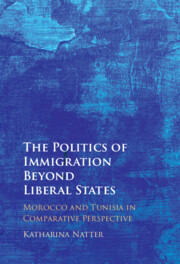Book contents
- The Politics of Immigration Beyond Liberal States
- The Politics of Immigration Beyond Liberal States
- Copyright page
- Dedication
- Contents
- Figures
- Tables
- Acknowledgements
- Note on the Text
- Abbreviations
- 1 Introduction
- 2 Theories on the Move
- 3 The Contrasting Cases of Morocco and Tunisia
- 4 Regime Continuity and Immigration Policy Change in Morocco
- 5 The Illiberal Paradox of Autocratic Policymaking
- 6 Regime Change and Immigration Policy Continuity in Tunisia
- 7 The Ambiguous Effects of Democratization
- 8 Immigration Politics and State Transformation
- 9 Conclusion
- Appendices
- Notes
- References
- Index
9 - Conclusion
Published online by Cambridge University Press: 12 January 2023
- The Politics of Immigration Beyond Liberal States
- The Politics of Immigration Beyond Liberal States
- Copyright page
- Dedication
- Contents
- Figures
- Tables
- Acknowledgements
- Note on the Text
- Abbreviations
- 1 Introduction
- 2 Theories on the Move
- 3 The Contrasting Cases of Morocco and Tunisia
- 4 Regime Continuity and Immigration Policy Change in Morocco
- 5 The Illiberal Paradox of Autocratic Policymaking
- 6 Regime Change and Immigration Policy Continuity in Tunisia
- 7 The Ambiguous Effects of Democratization
- 8 Immigration Politics and State Transformation
- 9 Conclusion
- Appendices
- Notes
- References
- Index
Summary
The Conclusion returns to the book’s central ambition: to leverage the contrasting cases of Morocco and Tunisia for more systematic theory-building on immigration politics beyond the liberal state. I summarize my key empirical and theoretical propositions and reflect on how they contribute to research on Moroccan and Tunisian migration politics, theories of immigration policy, and broader comparative politics, international relations, and political sociology scholarship. I also reflect on the most promising avenues for consolidating theory-building on immigration policymaking across the Global North/Global South and democracy/autocracy divides in the future. In particular, I hope to inspire readers to question the analytical power of binary categories such as democracy or autocracy for theorizing political processes, and to mobilize immigration policy as a lens to research political change and the inner workings of modern states.
Keywords
- Type
- Chapter
- Information
- The Politics of Immigration Beyond Liberal StatesMorocco and Tunisia in Comparative Perspective, pp. 220 - 228Publisher: Cambridge University PressPrint publication year: 2022

